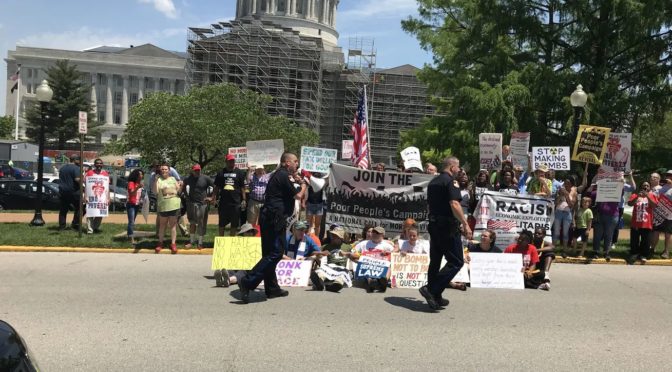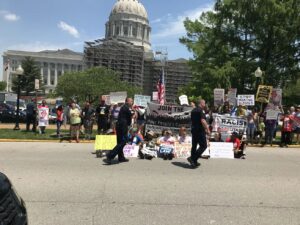Marine Iraq War veteran to be deported Tuesday to El Salvador (Marine Times)
Marine Iraq War veteran to be deported Tuesday to El Salvador (Marine Times)
“…Retired Air Force Master Sgt. Jeff Merrick said that deporting the Marine veteran after he served his prison sentence was a second punishment after he already paid his debt to society.
It’s “a real injustice to allow a veteran to be deported just because he got in trouble with the law,” Merrick said. “He paid his dues, now he is getting a lifetime sentence to a country he knows nothing about.”
Merrick is a board member of Military Families Speak Out, an organization of military and veterans families calling for improving the treatment of veterans when returning from war.
Merrick compared Segovia-Benitez’s deportation with failures at Department of Veterans Affairs hospitals around the country.
“It’s kind of like, ‘I’ll call you a hero until I have to pay something, once you’re out of the service I don’t care about you,'” Merrick said….”

How Are We Supporting our Troops when 20 Veterans Die by Suicide Every Day?
Excerpts from the speech given by Mary Hladky, MFSO Steering Committee Member, on May 20th in Jefferson City, MO at a Poor People’s Campaign protest of militarism. Soon after Hladky
issued this critique, she and 16 others blocked a
street, were arrested, and were released.
I am Mary Hladky. My son, Ryan, was an Army
Infantry Officer. During his deployment in
Afghanistan, the troops experienced some of the
highest death and injury rates of the war.
Today I want to talk to you about the war economy
and the incalculable harm this obsession does to all
Americans, and especially soldiers.
War drains the treasury of money. The Costs of
War Project at Brown University says US wars over
the past 16 years have cost $5.6 trillion. Our
officials justify this spending in the name of
national security. There is little left, it seems, for the
welfare of the people.
These same officials defend these massive expenses
as part of “supporting the troops”. But supporting our
troops should mean bringing them home and
taking care of them when they return.
How are we supporting the troops when many
military families need public assistance such as
food stamps to make ends meet, while defense
contractors rake in record profits?
There are 3 million veterans of the wars in Iraq
and Afghanistan. These soldiers have seen more
combat than veterans of any other wars. Many have
experienced moral injury – a violation of a person’s
moral values, core beliefs. The shame, guilt, and
torturous remorse that becomes moral injury often
results in suicide.
How are we supporting our troops when 20
veterans, from all wars, die by suicide every day?
Today, here and across the country, and all over
the world, our voices declare our work for a more
peaceful world, the hope of a movement; to realize
that true security is not measured by the size of our
military, but the welfare of our people.
Just before the arrest of Mary Hladky, Michael
McPhearson, and other activists
Photo by Bennette Dibben, PeaceWorks
Stop The Deportation of Veterans!
by Robert Vivar, Unified US Deported Veterans Resource Center and MFSO Steering Committee
August 1, the Unified US Deported Veterans Resource Center welcomed USMC Cpl.Robert Cano, another deported combat hero. The US DVR Center says that it is an injustice to discard those that should instead be honored for their service.. Our call is to LEAVE NO ONE BEHIND. Please help us support these forgotten veterans by leaving messages of support for Cpl. Cano at:Unified US Deported Veterans on Facebook or supporting their families here in the US.
The US DVA Center in Tijuana, Mexico provides the following help for deported veterans in California:
*Assistance with citizenship applications
*Assistance for deported veterans to have their cases reviewed
*Colef, (Colegio de la Frontera Norte) in Tijuana sponsors focus groups for deported persons that are interested in obtaining information on re-validating their US education and furthering their education in Mexico. There are plans for at least two focus groups – one for US military deported Veterans and another for those working in Call Centers, since without a higher education, your progress in the workplace is very limited.
*Emergency housing and employment assistance
MFSO Members, Immigrant Rights Groups, and Friends:
YOU can help the families of deported veterans still living in the U.S.:
*Help with housing or legal aid
*Ask members of Congress to introduce legislation to keep the promise to veterans that they will not be deported.
*We can put you in contact with families of deported veterans in these cities even if you don’t live there: Modesto, CA Los Angeles, CA Riverside CA San Diego, CA Phoenix, AZ Chicago, IL Las Vegas, NV Brownsville, TX Houston, TX Ontario, Canada You can help the families in many ways (depending on their needs), such as sending or bringing food, school supplies, and clothing, helping with housing, and providing legal aid. Your support and friendship will be welcomed.
If you are interested in helping the families of deported veterans, please email Robert Vivar: dvsh.rob at gmail.com.
MFSO Member’s Concerns about Pathway Home Began Long Before Shooting
My son was featured in a story done about Pathway Home in the Mercury News on 2/10/2011. My son was an inpatient at Pathway Home and at that time the founder and director was Fred Gusman. I started having concerns about the program and contacted them and requested to talk to Fred Gusman. He never returned my calls or e-mails. I was so concerned that I was going to drive from Southern California to Napa to talk to them in person and my son convinced me he could handle it.
My son had completed an actual VA PTSD treatment program in 2008 at Palo Alto VA hospital and it was an EXCELLENT PROGRAM and saved my son’s life. He started having problems again and we learned about Pathway Home and he entered their program in 2011. My first concerns about Pathway Home was I found out they were having financial problems. Since they didn’t have an instructor for their PTSD class, they were having my son teach the class since he had completed the Palo Alto PTSD Program. I told my son that you’re there as a patient not a paid instructor. My son’s life was also being threatened by his roommate and Pathway Home wasn’t doing anything to protect my son. That is when I tried to contact the director and he never returned my calls or e-mails. I was also contacted by a reporter doing a story on Pathway Home and I told him I had some concerns, but at that time there were so few programs out their that any program is better than none. Pathway Homes was doing a lot of media at that time to promote their program and to get donations. That is probably why Mercury News did the story on Pathway Home in 2011. I was concerned that they were more focused on funding and not on the treatment of PTSD.
I know Pathway Home closed in 2015 due to financial problems and Fred Gusman left. Then a new board was formed and it was opened again in 2016 or 2017.
When I heard about the shooting my heart stopped. I don’t know how the current Pathway Homes is being managed, but my concern is what are they doing with problem patients such as Veteran Albert Wong. When a problem patient is released from the program are they being offered alternate care or other resources? What was done to prevent a Veteran with PTSD from returning as Albert Wong did and killing these innocent women and protecting other patients and staff? What are they doing to make sure we don’t have another Albert Wong in the future? As families dealing with loved ones with PTSD, we need to know!
As a father of a disabled Iraq Veteran that has been dealing as a family with our son’s PTSD since 2006. I want to make sure that these programs are doing all they can to help prevent and protect the Veteran, the staff and other patients from what happened at Pathway Home this week.
I have been a member of Military Families Speak Out since 2006 and with other members of our group that have lost their loved ones to suicide and like my family trying to keep our son healthy and alive as he suffers from PTSD. We tell our stories and are a voice for our loved ones making sure that their problems with PTSD is being taken care of by the VA, DOD and other programs like Pathway Homes.

